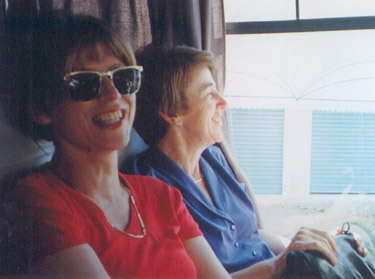4 May 1950 – 12 September 2001

My memories of Lidia are many but among my favourites are those where she displayed her skill as a raconteur. Her stories were taken from her everyday life and almost all were told with a laugh in her voice, a sparkle in her eyes and often a child-like indignation that these outrageous events could be happening to HER.
Her family immigrated to Australia from Poland in 1958 when Lidia showed another side of her character, determination. “When I first went to school, I didn’t speak for six months until my English and accent were perfect. I wasn’t going to be teased by ANYONE”. That strength of mind saw her achieve her childhood ambition of becoming doctor. She became a brilliant and much loved general practitioner in South Melbourne. One of her partners recently said, “Lidia was such an unbelievably good and thorough diagnostician that when she was on duty it was like having a consulting physician on call.”
Recently I asked Lidia what life was like in Poland. “It was PERFECT, until my brother Michael was born when I was four!” she said with a characteristic flash in her eyes. “After he came along I used to dream up ways of getting rid of him pushing him down stairs, dropping him out a window and the like.” She also said, “Michael and I became particularly close when I became sick.”
Family was always important to Lidia. She married Grant Kilvington in 1972 and in 1978 Emily was born. Julia followed in 1980 and Trevor in 1982. To each of them she gave her unconditional love and the aid of her truly formidable intellect. Indeed one teacher is reported to have said to Julia, “Tell your mother she got an A for your assignment.”
A dominant force in Lidia’s life was contract bridge. She had a partnership of over twenty-seven years with Margaret Bourke, starting in 1974. Over the next fourteen seasons they made the Victorian Women’s team eleven times, winning six national titles. However it was not until 1988 that Lidia qualified with Margaret for the national women’s team, to achieve another long-held ambition.
Also in 1988 Lidia’s marriage to Grant ended. In 1989 she married David Beech and, with their combined seven children, they enjoyed the warming chaos that big families so often have.
However, her bridge seemed to be treading water until 1993. Then, suddenly, it was as if she expected to win Women’s events as a matter of right. Indeed 18 of her 33 national titles came in the next eight years, including the honour of continuous Australian representation.
All seemed to be on track for her moving to the next level on the international bridge stage too. Alas double disaster struck during 1997. First, she was diagnosed with breast cancer. She responded well to treatment and played with a new intensity. Unfortunately late in 1997 David suffered the major heart attack they had expected for so long and he died in January 1998.
The next few months were a blur for her. Finally she started to come out of the fog, thanks in large part to another bridge player, Bobby Richman. When the cancer returned late in 1998, it was he who provided the daily support. It was he too who helped complete the rapprochement with Grant, which gave strength to Lidia during her last months.
Although Lidia responded to treatment during 1999 and 2000, she was on borrowed time. This was dramatically demonstrated during the 2000 Bridge Olympiad in Maastricht when she collapsed during play, ending her active participation in the event.
Still, she was not done with bridge at the National level. In June this year she played on a team in the Victor Champion Cup in a wheel chair with an ever-present oxygen bottle. Her team finished a meritorious third and set a record for applause at the prize-giving ceremony. Everyone present knew it was her last event and showed their appreciation of having known her in the only way they could. It was a deeply moving moment.
By now she and the children had moved back into Grant’s house, a wonderful act of completion. Her long battle was near its end when she entered hospital in August and she gradually slipped away. Lidia lived just over fifty-one years but packed more into it than most would with three times that span.
Vale, Liddy we shall miss your liveliness, humour and excitement-oriented bridge. No one will ever match the latter.
Tim Bourke
